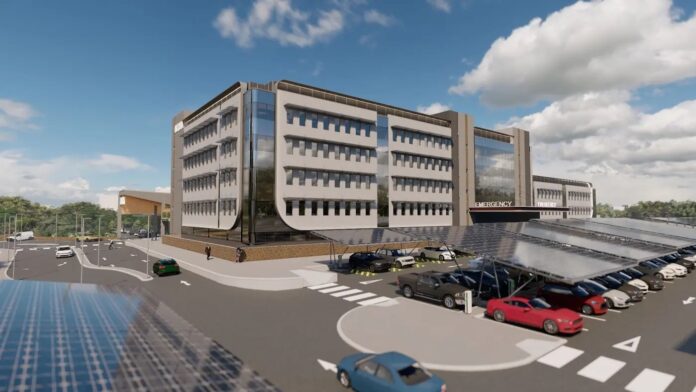Ethiopia hopes to reinvent its biggest city as an African medical tourism hub with a new $400 million hospital complex set to open next year. But the plan for a major for-profit hospital in a country with a health system close to collapse is already being criticized.
The Roha Medical Campus, which is backed by U.S. investors, is being built close to Bole Airport in Addis Ababa, which is already one of Africa’s busiest air transit hubs thanks to Ethiopian Airlines which flies to around 60 African cities. The hope is that patients will stop in the city for medical services rather than flying on to the West, or countries such as Turkey, or India.
Africans spend more than $5 billion annually traveling outside the continent, according to Roha’s analysis of statistics from the World Bank and the U.S. National Library of Medicine. Many people are seeking advanced medical treatment especially as noncommunicable diseases like cancer, diabetes, and hypertension rise across the continent. Ethiopians spend an estimated $500 million on medical tourism, according to an unpublished health ministry report seen by Semafor Africa.
Lia Tadesse, who stepped down as minister of health earlier this month, has been a key supporter of the project. She told Semafor Africa the government had “prioritized support” for projects like the new center as it could help reduce the need for Ethiopians to spend scarce foreign exchange on seeking medical treatment abroad and open up a new market for the country. “We subsequently expect it to attract many clients from the region and continent.” Support from the government has included the Addis Ababa city administration availing 28 hectares of land for its construction.
“The vision is to capture those heading elsewhere and afford them top quality and reliable medical services as well be a hub for neighboring nations who use Ethiopian Airlines to head to popular destinations for healthcare,” Welela Haileselassie, the general manager of Roha Medical Campus, told Semafor Africa.
Accessing adequate healthcare remains a major challenge for most of Ethiopia’s roughly 120 million citizens. Damage to medical buildings during conflicts over the last two years has added to pressure on the health system caused by a long-term shortage of hospitals and clinics in Africa’s second most populous country. And those facilities that have remained open often lack basic equipment and supplies.
The situation is exacerbated by a shortage in foreign currency reserves. Hospitals report being unable to purchase necessary medical imports due to a shortage of foreign currency like the US dollar. The forex scarcity has seen some unscrupulous entrepreneurs illegally importing and selling medicines at exorbitant prices and without adhering to regulatory standards.
These challenges lead middle class and wealthy Ethiopians to travel abroad for surgery, advanced tests, and specialized treatment. The new medical campus will have four centers of excellence in cardiology, nuclear medicine, oncology, and neuro-spinal services. It is expected to employ over 4,000 medical, administrative and ancillary staff, with over a quarter of the doctors initially being expatriate staff.
In Ethiopia, those without the financial capacity to migrate from the country have to rely on under-resourced public hospitals or go without proper medical care entirely.
A growing African middle class continues to head outside of the continent to seek medical assistance and this is what the new hospital hopes to benefit from within the region. Samson Berhan, an Addis Ababa based economic analyst, believes such investment in the local health sector is profoundly important. “In the long term, It will enable Ethiopia to develop the potential to become a medical tourism hub not only for its own citizens, but also for other East African nations struggling with similar shortages in healthcare resources and infrastructure,” he said.
While the government has not invested directly in this private hospital, one would hope that it has worked out some way that the new medical campus can contribute directly to Ethiopia’s health facility shortages, perhaps by offering some partially funded specialist treatment for example. Most Ethiopians will not be able to afford being treated in this new facility otherwise.
Title iconRoom for Disagreement
Ethiopia’s northern Tigray region has been one of the regions most underserved by healthcare services in recent years. A hard-fought two-year war between rebels and the country’s army had devastating consequences for its hospitals and clinics. “The region’s health care system has collapsed,” said Dr Fasika Amdeslasie, a surgeon at Mekele University’s College of Health Sciences, a publicly owned institution.
“A majority of our people can’t even afford basic medicine let alone basic care. While such enterprise [Roha Medical Campus] is welcomed, I hope the government gives its urgency and priorities to the public sector more,” the surgeon told Semafor Africa.Ethiopia hopes to reinvent its biggest city as an African medical tourism hub with a new $400 million hospital complex set to open next year. But the plan for a major for-profit hospital in a country with a health system close to collapse is already being criticized.
The Roha Medical Campus, which is backed by U.S. investors, is being built close to Bole Airport in Addis Ababa, which is already one of Africa’s busiest air transit hubs thanks to Ethiopian Airlines which flies to around 60 African cities. The hope is that patients will stop in the city for medical services rather than flying on to the West, or countries such as Turkey, or India.
Africans spend more than $5 billion annually traveling outside the continent, according to Roha’s analysis of statistics from the World Bank and the U.S. National Library of Medicine. Many people are seeking advanced medical treatment especially as noncommunicable diseases like cancer, diabetes, and hypertension rise across the continent. Ethiopians spend an estimated $500 million on medical tourism, according to an unpublished health ministry report seen by Semafor Africa.
Lia Tadesse, who stepped down as minister of health earlier this month, has been a key supporter of the project. She told Semafor Africa the government had “prioritized support” for projects like the new center as it could help reduce the need for Ethiopians to spend scarce foreign exchange on seeking medical treatment abroad and open up a new market for the country. “We subsequently expect it to attract many clients from the region and continent.” Support from the government has included the Addis Ababa city administration availing 28 hectares of land for its construction.
“The vision is to capture those heading elsewhere and afford them top quality and reliable medical services as well be a hub for neighboring nations who use Ethiopian Airlines to head to popular destinations for healthcare,” Welela Haileselassie, the general manager of Roha Medical Campus, told Semafor Africa.
Accessing adequate healthcare remains a major challenge for most of Ethiopia’s roughly 120 million citizens. Damage to medical buildings during conflicts over the last two years has added to pressure on the health system caused by a long-term shortage of hospitals and clinics in Africa’s second most populous country. And those facilities that have remained open often lack basic equipment and supplies.
The situation is exacerbated by a shortage in foreign currency reserves. Hospitals report being unable to purchase necessary medical imports due to a shortage of foreign currency like the US dollar. The forex scarcity has seen some unscrupulous entrepreneurs illegally importing and selling medicines at exorbitant prices and without adhering to regulatory standards.
These challenges lead middle class and wealthy Ethiopians to travel abroad for surgery, advanced tests, and specialized treatment. The new medical campus will have four centers of excellence in cardiology, nuclear medicine, oncology, and neuro-spinal services. It is expected to employ over 4,000 medical, administrative and ancillary staff, with over a quarter of the doctors initially being expatriate staff.
Title iconSamuel’s view
In Ethiopia, those without the financial capacity to migrate from the country have to rely on under-resourced public hospitals or go without proper medical care entirely.
A growing African middle class continues to head outside of the continent to seek medical assistance and this is what the new hospital hopes to benefit from within the region. Samson Berhan, an Addis Ababa based economic analyst, believes such investment in the local health sector is profoundly important. “In the long term, It will enable Ethiopia to develop the potential to become a medical tourism hub not only for its own citizens, but also for other East African nations struggling with similar shortages in healthcare resources and infrastructure,” he said.
While the government has not invested directly in this private hospital, one would hope that it has worked out some way that the new medical campus can contribute directly to Ethiopia’s health facility shortages, perhaps by offering some partially funded specialist treatment for example. Most Ethiopians will not be able to afford being treated in this new facility otherwise.
Title iconRoom for Disagreement
Ethiopia’s northern Tigray region has been one of the regions most underserved by healthcare services in recent years. A hard-fought two-year war between rebels and the country’s army had devastating consequences for its hospitals and clinics. “The region’s health care system has collapsed,” said Dr Fasika Amdeslasie, a surgeon at Mekele University’s College of Health Sciences, a publicly owned institution.
“A majority of our people can’t even afford basic medicine let alone basic care. While such enterprise [Roha Medical Campus] is welcomed, I hope the government gives its urgency and priorities to the public sector more,” the surgeon told Semafor Africa.

























